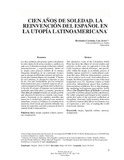Mostrar el registro sencillo del ítem
Cien años de soledad. La reinvención del Español en la utopía Latinoamericana
| dc.rights.license | http://creativecommons.org/licenses/by-nc-sa/3.0/ve/ | |
| dc.contributor.author | Hernández C., Luis Javier | |
| dc.date.accessioned | 2014-12-10T19:39:10Z | |
| dc.date.available | 2014-12-10T19:39:10Z | |
| dc.date.issued | 2014-12-10T19:39:10Z | |
| dc.identifier.issn | 0798-1570 / Electrónico: 22448438 | |
| dc.identifier.uri | http://www.saber.ula.ve/handle/123456789/39484 | |
| dc.description.abstract | La obra emblema del premio nobel colombiano ha sido objeto de diversos estudios y análisis; en este caso, la abordamos desde el discurso cultural latinoamericano, y específicamente, dentro de la utopía como proceso infinito de la intensa búsqueda identitaria de un continente mestizo que se apropia de diferentes sistemas de representación para intentar lograr tal cometido. Y dentro de esos intentos, la perspectiva literaria es una de las vías más frecuentadas por los escritores latinoamericanos para construir espacios de novedosa interpretación que linda entre la historia y la ficción. Es así que, el lenguaje, ese instrumento mediador entre el hombre y su mundo, permite en Cien años de soledad refundar un mundo posible que alegoriza la historia no contada, sino imaginada y fusionada en los espíritus sensibles que hacen de la simbología universal una instancia inmediata, cercana y cotidiana; la constituyen en memoria afectivizada que permite refundar una forma de expresión; una nueva manera de leer el mundo desde Latinoamérica. | es_VE |
| dc.language.iso | es | es_VE |
| dc.rights | info:eu-repo/semantics/openAccess | |
| dc.subject | Utopía | es_VE |
| dc.subject | Español | es_VE |
| dc.subject | Cultura | es_VE |
| dc.subject | Memoria | es_VE |
| dc.subject | Imaginación | es_VE |
| dc.title | Cien años de soledad. La reinvención del Español en la utopía Latinoamericana | es_VE |
| dc.title.alternative | One hundred years of solitude. The reinvention of spanish in latin american utopia | es_VE |
| dc.type | info:eu-repo/semantics/article | |
| dc.description.abstract1 | The distinctive work of the Colombian Nobel Prize has been the object of several studies and analysis; in this case, we approach it from the Latin American cultural discourse, and specifically within the utopia as an infinite process of identity intense search for a multicultural continent that takes different representation systems to try to achieve such a task. And within those attempts, the literary perspective is one of the most frequented ways for American writers to build innovative interpretation spaces that mediates between history and fiction. It is so, that language, the mediating tool between man and his world, allows One Hundred Years of Solitude to refound a possible world that allegorized the untold story, but rather imagined and merged in the sensitive spirits that make of the universal symbolism an immediate, close and a daily instance; it becomes an affective memory that allows to refound a way of expression; a new way of reading the world from Latin America. | es_VE |
| dc.description.colacion | 5-19 | es_VE |
| dc.description.email | luish@ula.ve, hercamluisja@gmail.com | es_VE |
| dc.description.frecuencia | Semestral | |
| dc.identifier.depositolegal | PP92-0047 | |
| dc.identifier.eissn | 22448438 | |
| dc.subject.centroinvestigacion | Centro de Investigaciones Literarias y Lingüísticas Mario Briceño Iragorry | |
| dc.subject.facultad | Núcleo Rafael Rangel (NURR) | es_VE |
| dc.subject.keywords | Utopia | es_VE |
| dc.subject.keywords | Spanish | es_VE |
| dc.subject.keywords | Culture | es_VE |
| dc.subject.keywords | Memory | es_VE |
| dc.subject.keywords | Imagination | es_VE |
| dc.subject.publicacionelectronica | Revista Cifra Nueva | |
| dc.subject.seccion | Revista Cifra Nueva: Estudios | es_VE |
| dc.subject.thematiccategory | Artes y Humanidades | es_VE |
| dc.subject.tipo | Revistas | es_VE |
| dc.type.media | Texto | es_VE |
Ficheros en el ítem
Este ítem aparece en la(s) siguiente(s) colección(ones)
-
Cifra Nueva - Nº 030
Julio - Diciembre 2014


